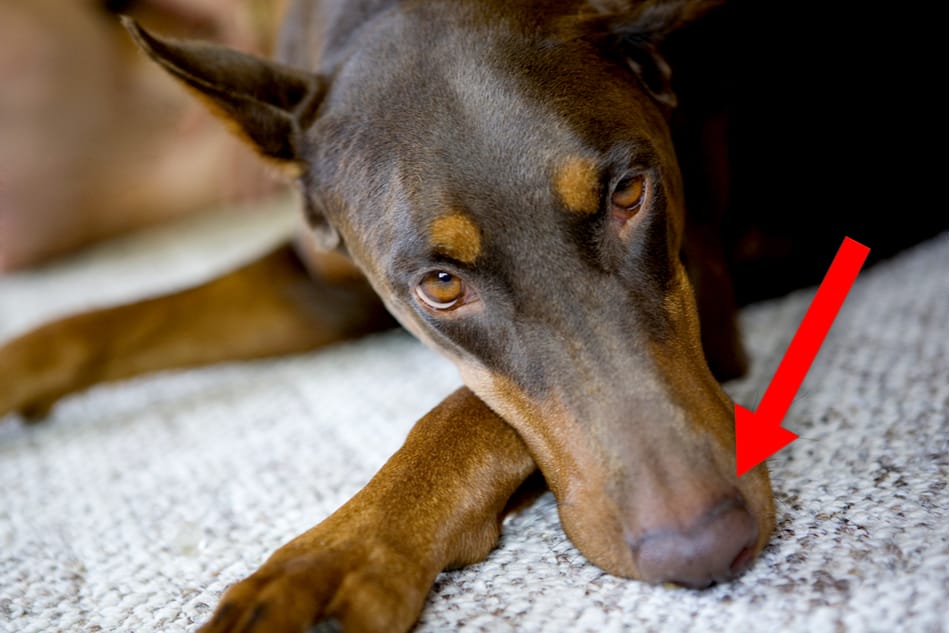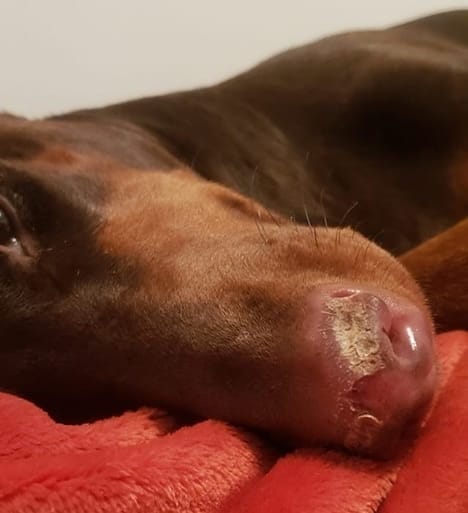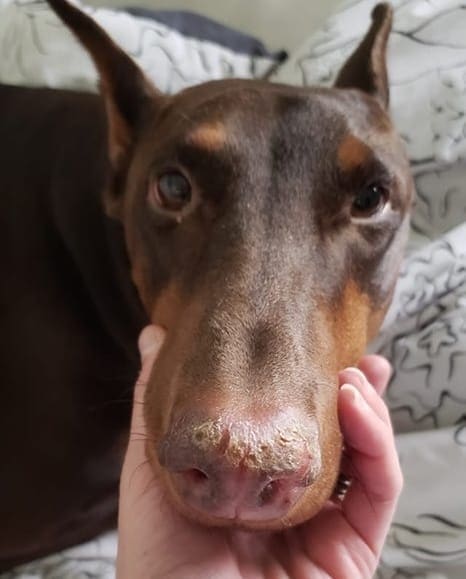
Reviewed by Donald Buchanan, DVM
A dry nose is very common in many breeds, and this is definitely the case with Dobermans. Luckily, a majority of the time your Doberman’s dry nose is completely normal. However, there are a few instances where it can be a sign of a bigger problem. Most long-time Doberman owners like myself have dealt with this issue and there are some common reasons why Dobermans get dry noses and some go-to techniques that seem to work best.
Why is my Doberman’s nose dry? A Doberman’s nose naturally goes through wet and dry cycles throughout the day. A temporarily dry nose is completely normal, while one that lasts can indicate a medical condition varying from mild to serious in nature.
Table of Contents
Many first time Doberman owners are usually very concerned when they first notice their dog’s dry nose. Luckily many causes of a dry nose are easily corrected while some don’t require you to take any action at all. However, the nose of a dog can be a strong indicator of the dog’s overall health and may, especially in the case of a persistent dry nose, indicate a more serious medical condition.
The Normal Doberman Nose
Doberman’s rely heavily on their nose and are known to have strong scenting abilities. A moist nose is necessary for bringing in scents more efficiently to be further examined by the dog’s olfactory glands (source). However, there are natural cycles to the nose and it’s normal for your Dobie’s nose to not always be cool and moist all day long.
Although your dog’s nose can get naturally dry or moist throughout the day for varying reasons, below are some of the more common times when your Doberman’s nose is likely to be either dry or moist.
- Morning – It’s natural for a dog’s nose to dry out during the night and stay that way for a short time after waking up. So it’s common for your Doberman to have a dry nose immediately after waking up in the morning, and for about 10 minutes afterward. After that, your Dobie will likely have moistened their own nose simply by licking it.
- Afternoon – During the daytime your dog’s nose will likely stay moist. Dobermans are very active dogs and are typically doing things all day long. Throughout their normal activities, you’ll likely see them licking and re-wetting their nose multiple times in the day—this is completely normal.
- Night – Humans and dogs alike will naturally lose a bit of water during the night time hours. It’s normal for both you and your Dobie to wake up a bit more dehydrated than when you went to sleep. This means your Dobie’s nose, while he’s sleeping, is likely to be drier than during the day when he’s active.
- Drinking – It’s normal for your Doberman to use their time drinking from their water bowl to re-wet their nose. They’ll do this by stopping drinking and licking at their nose with their wet tongue.
- Exercising – You’re probably already aware that dogs pant as a means to sweat while they’re getting lots of physical exercise, but you may not have known that they also naturally sweat through their nose and paws. This means that your Doberman will likely have a nose that’s warm and moist while being active and getting their daily exercise.
- Scenting – If your Dobie has found a specifically interesting scent that he’s in the process of exploring, you’ll likely notice his nose getting more moist—this is also normal. A thin layer of mucus will naturally develop on the nose which helps them to better process the scents they’re smelling. Your dog will also then lick at their nose and transfer this to their mouth for further processing of the scents.
As you can see, there are many natural reasons that are completely normal for your Doberman’s nose to be wet or dry throughout the day. So don’t worry too much just because your Dobie goes from a warm and wet nose to a cool dry nose throughout the day.
Now every dog may have slightly different cycles so it may be helpful for you to make notes throughout the day when you notice your dog’s nose is dry and when it’s not. While making these notes, be sure to include what the dog was doing around this time and what time of day it was so that you can look for trends. Then you’ll have a great understanding of what’s normal for your Dobie.

Causes of a Dry Nose in Dobermans
There are many potential causes of a dry nose in Doberman Pinschers. Luckily, the most common reasons are fairly harmless and very normal for them to experience. There are a few possible causes however, that can be more serious. When in doubt, make sure to take your dog to a qualified veterinarian for an individual assessment.
#1 – Sleeping
As mentioned earlier, it’s normal for your Dobie’s nose to dry out somewhat overnight. As your dog sleeps, he’s not able to re-wet it by continuously licking it as he does throughout the day. Also, like with humans, it’s natural for your dog’s body to get slightly dehydrated during the overnight hours. That’s why your Doberman will often head towards his water bowl right away when he wakes up. Within about 10 minutes of waking, your dog’s nose should be warm and moist again.
#2 – Winter
In most areas of the world, winter can be very drying to human and dog skin alike. It’s common to run your household heating system more often during the winter which pumps warm air with very low levels of humidity throughout your house. For these reasons, you may notice your hands getting drier in the winter and your dog’s nose getting drier also.
Dobermans have very short, single-layered coats which don’t provide them with much insulation and they also just seem to have a general disdain for cold weather. So it’s probably not uncommon to see your Dobie huddled up by the air vet or fireplace during the winter months. This extra warmth and dry air-flow can quickly dry out their nose.
#3 – Irritation
A common and generally benign reason your Doberman’s nose might become dried out is from irritation. Maybe your dog has been nosing around in their favorite dirt hole they dug in your backyard. This type of activity can quickly irritate, and dry out, their nose.
Also, the Doberman breed is known to be susceptible to skin irritations. It isn’t uncommon for them to have a sensitivity to a plastic feeding bowl (or some dogs may even have it to their metal feeding bowls). If this is the cause of their dry nose, it’s common to also see small red pimple-like bumps on the bottom of their chin as well. If you suspect this may be the cause, try switching their feeding and water bowls to a different material. Plastic, stainless steel, and ceramic bowls are all possibilities to try.
#4 – Dehydration
If your Dobie hasn’t had enough water and might be somewhat dehydrated, this can cause a dry nose. The lack of moisture in the dog’s mouth also makes it tough for them to rewet their nose by liking at it—something they rely on to help keep it moist.
This is common after strenuous exercise or during unusually hot days. One way to check the hydration levels of your dog is to look at their gums. Gums that are pink and moist to the touch mean there’s good hydration. Gums that are dry, pale, and tacky to the touch indicate they may be dehydrated. It’s best to just allow your Doberman to regulate their own hydration levels by always providing him with plenty of cool water throughout the day, especially if they’re suffering from a dry nose.
#5 – Sunburn
Dogs are susceptible to sunburn just like humans are. Dobermans are covered by a short single-layer coat though which means it’s more likely for them to get sunburned than many other breeds with a two-layer coat. However, their noses are always exposed to the sun due to a lack of fur in that area. This means it can easily get sunburned, causing it to dry out.
Most Doberman types and colors have a dark-colored nose. This is certainly true for the most common color of Doberman out there, the black and rust. However, the red and rust-colored Doberman has a slightly lighter colored nose and the white Doberman has an even lighter nose. This means that these dogs are more susceptible to damage to their nose from the sun.
#6 – Allergies
Dobermans are certainly known to be susceptible to allergies. It’s common for this to be related to your typical seasonal allergies so if this issue is only happening during just one part of the year, then this may be your cause. Dobermans will also often get eye discharge (eye boogers) and other common allergy symptoms as well. Your vet can prescribe allergy medications that may provide some relief.
Another possibility is that your Dobie has some allergy to something in their diet. If you just started a new type of dog food right before the dry nose issue began, maybe try changing back to see if the issue goes away. Remember to transition foods gradually so as to not upset your dog’s stomach.
Many people solve allergy issues by transitioning to a quality human-grade and home-cooked food diet for their Doberman. It can be tough to prepare this yourself every day so that’s why I recommend a great home delivery service that makes this easy on my recommended foods for Dobermans page.
#7 – Old Age
The average lifespan of a Doberman is between 10 and 13 years of age, but of course many are known to live longer than that. Now, this doesn’t happen with all dogs, but some will naturally have a drier nose as they age. If your Doberman suddenly got a dry nose, this probably isn’t the cause. However, if it came on gradually and they are a bit up there in age, this could just be a natural part of getting older for them.
#8 – Discoid Lupus
Discoid lupus is a chronic autoimmune disease that affects your dog’s skin. This is certainly one of the more serious potential causes of a dry nose. Luckily this cause is a bit less common than the others listed here. Other symptoms might include circular lesions on the skin and a skin rash that gets worse when exposed to the sun.
If you think this may be the cause of your Doberman’s dry nose, consult with a qualified veterinarian. For more information, see VCA Hospital’s Article on discoid lupus in dogs here.
#9 – Pemphigus
Pemphigus is another autoimmune disease that can affect your dog’s skin. Luckily, just like with discoid lupus, this is also a less common reason a Doberman will have a dry nose. Pemphigus can cause the nose to dry out and crack. It also frequently affects the ears and pads of your Dobie’s feet as well. Many dogs affected with this will also have shallow ulcers, itching of the skin, and redness.
Like with the previous cause listed here, if you think this is possibly why your Dobie has a dry nose, it’s important to take him to a qualified veterinarian to have him checked. For more information on pemphigus, see PetMD’s Article on pemphigus here.
#10 – Distemper
Canine distemper virus (also often called “hard pad disease”) is a viral infection that often results in thickened, dry nose and footpads. This virus is passed easily from dog to dog, by wildlife, through the air (coughing and sneezing), and via shared food or water bowls.
Dogs that are affected by this will often appear to be very sick, as the viral infection affects both the nervous system and the respiratory system. Distemper virus infections are preventable and your Doberman should be protected from it through routine vaccination. Distemper is usually fatal, but a dog who survives the infection will have some long-lasting symptoms, such as persistent hard pads and nose.
“It is easy to get caught up on one specific skin issue, don’t forget to check the rest of your Dobie’s skin for signs of dryness or crusting. Areas to consider which may hint at a more generalized problem include ear tips, the backside of the hind legs, mouth, and paw pads.”
– Donald Buchanan, DVM

Treatment
There are many possible treatments for a dry nose on a Doberman, but just keep in mind that most of these only treat the nose itself. So if this condition is a symptom of a bigger problem (such as an autoimmune disease), then you will want to make it a priority to treat the underlying cause first.
However, most causes can be improved considerably simply by helping your Dobie to introduce a little more moisture to their nose. Anytime you choose a topographical means to help moisturize your dog’s nose, make sure it’s something that’s safe for them to eat. Your Dobie will lick their nose constantly throughout the day and no matter how careful you are, whatever you put on your dog’s nose will end up in their mouth.
- Nose Butter – There are some companies out there making “nose butter” products that are made specifically to moisturize your dog’s nose. Blissful Dog Nose Butter (Amazon link) is one of the better-known ones. It’s formulated specifically for dogs, is non-toxic, and does an excellent job introducing moisture back to your dog’s nose.
- Sunblock – Dog specific sunblock can help if a sunburn is the cause of your dog’s dry nose. Just make sure it’s edible since they will lick their nose quite frequently throughout the day. This is especially important if you have a Doberman with a lighter colored nose (such as the white or cream-colored Doberman).
- Petroleum Jelly (Vaseline) – Good old Vaseline is often used by Doberman owners who are dealing with a dry nose. You probably have some in the cupboard right now. It’s non-toxic but it’s a good idea to do your best to keep your dog from licking too much of it. Use a small dab on the nose and try to get it rubbed in well. Then distract your dog for a bit until he forgets it’s there.
- Shea Butter – Shea butter is a moisturizer that many owners use on their dog’s feet and other areas. It works well for both people and dogs. It’s safe for dogs but just make sure you take note of any other ingredients in the shea butter product you’re thinking about using.
- Coconut Oil – Coconut oil is very moisturizing and it’s also safe for dogs. It has many vitamins and minerals which will help improve the skin’s elasticity. Make sure to get natural and unprocessed oil.
- Bag Balm – This is a skin moisturizer that was originally developed for use on irritated cow udders. However, many dog owners have started using it to introduce moisture back into their dog’s skin. It’s very effective and although it shouldn’t do your dog any harm if they lick it, it’s not recommended. It contains an antiseptic which could cause some problems if it’s consumed, especially in large amounts. Here’s the original Bag Balm on Amazon.
- Olive Oil – Olive oil is very safe for dogs and can definitely help moisturize your Doberman’s nose. Remember, a little goes a long way. Some owners will even add a teaspoon to their dog’s meals to help promote healthy skin and coat.
- Omega 3 Fish Oils – Supplementing with Omega 3 fish oils tends to help your dog’s skin and coat from the inside out. It can also help to promote a healthier and more moist nose.
If you want ideas specifically geared towards natural remedies for your dog’s dry nose, see iHeartDogs article on natural ingredients to soothe your dog’s nose here. Keep in mind that it’s always best to consult with a veterinarian before starting to add various supplements to your dog’s diet.
“In cases where the underlying cause has been determined to be benign, simply monitoring the nose may be appropriate.”
– Donald Buchanan, DVM
When to See a Veterinarian
This isn’t an all-inclusive list, of course, but if your Dobie has the following symptoms in addition to a dry nose, then it’s important you get him in to see a qualified veterinarian.
- Thick nose discharge.
- Fever (102.5°F, or about 39°C is considered a normal body temperature for a dog).
- Any type of colored discharge from the nose.
- Any signs of internal nose irritations such as pawing or scratching at the nose.
- Bleeding from the nose.
In general, if you are at all concerned for your Doberman’s health or well being then it’s worth a trip to the vet. It’s no secret that the Doberman breed is susceptible to a number of health conditions. Many of these conditions can be well managed if caught early enough so it’s always best to be extra cautious when it comes to your Dobie’s health.
Related Questions
Is a Doberman’s nose supposed to be wet or dry? A wet nose on a Doberman is normal. During certain times of the day or under certain conditions, a dry nose can also be normal. A chronic dry nose or one that starts to show damage from lack of moisture, such as cracking, is abnormal and should be addressed.



Excellent article. I live in Palm Springs CA where summers are hot and is dry year round, do you think dobermans would struggle in a desert climate?
Possibly from time to time, they may have a dry nose issue (just like how people can get dry skin or chapped lips in dry climates), but overall there are plenty of Dobies living in desert climates that are completely fine. So I think it’s something to watch out for maybe, but nothing to stress too much about.